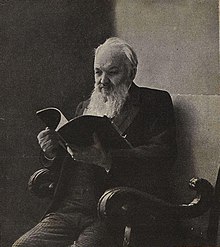Alexei Sergeyevich Suvorin
Aleksey Suvorin ( Russian Алексей Сергеевич Суворин ., Scientific transliteration Aleksej Suvorin Sergeevič ; born September 11 . Jul / 23. September 1834 greg. In Korschewo, Ujesd Bobrov , Voronezh Governorate ; † August 11 jul. / 24. August 1912 greg . in Tsarskoye Selo ) was a Russian publisher , publicist , playwright and theater critic . Since 1876 he has published the magazine Novoje wremja ("New Time") and was friends with the author Anton Chekhov for a long time .
Life
Suvorin was the son of a captain. He graduated from a military school in Voronezh , but soon resigned from serving in the army and instead devoted himself to teaching. In addition, Suworin began to write more and more essays and short stories, which he published in various magazines from 1858. After some of his texts (which were published under a pseudonym) appeared in the Moscow magazine Russkaya Retsch , the publisher of this magazine invited him to work as an editor in Moscow. Suvorin moved there in 1861 and published several short stories and essays in the years that followed, both in Russkaya Retsch and, after its discontinuation, in well-known literary magazines such as the Sovremennik .
In 1863 Suvorin moved to Saint Petersburg. There he also published satirical texts in the newspaper Sankt-Peterburgskije Vedomosti , which he later printed as a separate collection. For this collection, which was felt by the tsarist censors to be too liberal, Suvorin had to endure a judicial process in 1866 and then three weeks of criminal arrest . In the late 1860s and early 1870s, Suvorin published a number of features in Sankt-Peterburgskije Vedomosti under the pseudonym Nesnakomez ("Unknown") . In this activity Suvorin showed himself to be a good satirist who, among other things, chose well-known conservative journalists as his target. This is considered to be one of the main reasons why the entire editorial staff of Vedomosti, including Suvorin, was dismissed in 1874.
At the beginning of 1876 Suvorin acquired a stake in the Petersburg newspaper Novoje wremja and has been its publisher since then and until his death in 1912. During this period, the formerly ailing newspaper managed to have a considerable circulation of up to 30,000 copies, thanks not least to the extensive coverage of the Russo-Turkish War . After acquiring Novoye Vremja, Suvorin moved away from the formerly liberal spirit of his publications and instead attached importance to Pan-Slavic patriotism, especially when reporting war , to which the newspaper owed its increased popularity.
In 1885, Suvorin met the promising young author Anton Chekhov during his first visit to Petersburg and immediately persuaded him to write his stories for Novoye Vremja and to have anthologies printed in the associated publishing house. He offered Chekhov a higher fee than he was used to at the time, and was able to impress the young author in many ways, not least thanks to his excellent general education and extensive knowledge of literature and the concerns of the authors. The close collaboration and friendship between Chekhov and Suvorin lasted from 1886 to 1899. The extensive correspondence between the two of them during this period is considered an important contemporary document that sheds light on a multitude of aspects of Chekhov's work and his way of thinking.
" The Tolstojsche Morale [has] stopped me to stir in the depths of my heart I am their adjusted hostile [...] In my veins flows the blood Bauer, with Bauer virtues nobody puts me to astonish. From an early age I believed in progress and couldn't help but believe in it, because the difference between the time I was hit and the time I was stopped was terrible [...] Consideration and a sense of justice tell me that there is more human love in electricity and steam power than in chastity and the rejection of meat. "
During his time at Novoye Vremja, Suvorin's writing activity declined sharply compared to the 1860s. However, in the 1890s, Suworin devoted himself more to the theater and was known at that time both as a critic and as the author of his own plays (including the comedy Tatjana Repina (1889)).
Individual evidence
- ^ Anton Čechov: Letters in five volumes, Zurich 1979. Vol. III, p. 133
Web links
- Biography on peoples.ru (Russian)
- Short biographies on hrono.ru (Russian)
- Suvorin's collection of works (Russian)
| personal data | |
|---|---|
| SURNAME | Suvorin, Alexei Sergeyevich |
| ALTERNATIVE NAMES | Suvorin, Aleksej Sergeevič (transliteration); Суворин, Алексей Сергеевич (Russian spelling) |
| BRIEF DESCRIPTION | Russian publisher, publicist, playwright and theater critic |
| DATE OF BIRTH | September 23, 1834 |
| PLACE OF BIRTH | Korschewo at Bobrow |
| DATE OF DEATH | August 24, 1912 |
| Place of death | Tsarskoye Selo |
